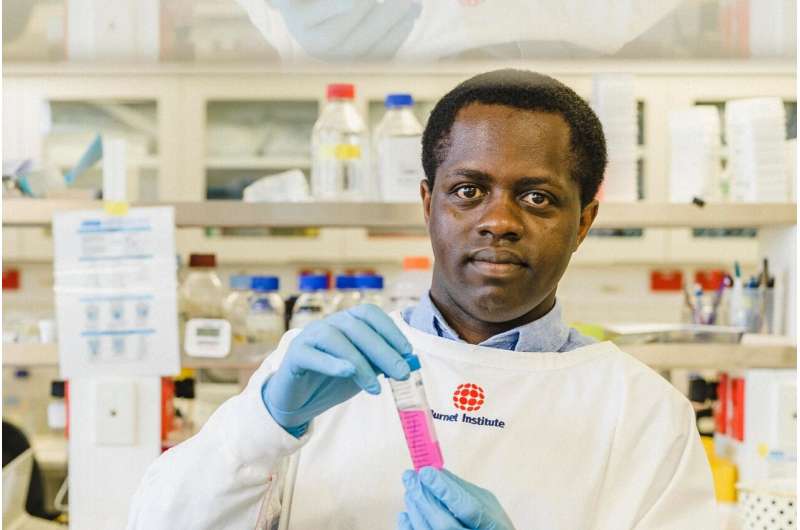How COVID-19 is affecting global efforts to eliminate malaria

The epidemiology of COVID-19 is complicated. We've worked out the virus spreads through the air, so instead of wiping things down as was first recommended in 2020 we are now looking to masks and ventilation as key public health tools to prevent community transmission.
But for a disease such as malaria which is spread by a vector (in this case a mosquito), stopping transmission presents a whole different set of challenges.
Burnet Institute malaria vaccine researcher, Dr. Herbert Opi, understands the difficulties of eliminating the disease.
"If a mosquito bit me and I had malaria, it would have to develop for several days in the mosquito first before it could infect another person. It's quite complex," Dr. Opi said.
This complexity is part of the reason some areas of Kenya, Dr. Opi's home country, are badly affected by malaria while other areas rarely see a case. Compare this to COVID-19, which has affected all parts of Kenya in four waves since mid-2020.
"COVID-19 just adds another layer of complexity to what people are already finding difficult to deal with," Dr. Opi said.
Significant gains have been made towards eliminating malaria since 2000, but the coronavirus pandemic threatens to disrupt gains in Asia-Pacific, South America and across Africa, including Kenya.
Burnet Institute Deputy Director and a malaria specialist, Professor James Beeson said history tells us malaria is quick to come back once society takes its foot off the elimination pedal.
Professor Beeson, who heads up Burnet's Malaria Immunity and Vaccines Group, said this isn't the first time that progress in combating the burden of malaria has stalled.
"There are many examples of countries that got malaria right down in the 1950s, '60s and '70s, and then resources were diverted away and malaria bounced back rapidly," he said. "In some countries the numbers went higher than they were before the elimination campaign started."
Now, as countries direct resources to stop COVID-19, Professor Beeson hopes malaria elimination efforts aren't lost.
A complex problem: Developing an effective malaria vaccine
Drug resistance and insecticide resistance present significant hurdles, but Professor Beeson says one elusive tool could make a significant difference: an effective vaccine.
"The recent World Health Organization approval for using the RTS,S malaria vaccine in children is an incredibly important milestone. Many deaths from malaria are in young children under five years of age," Professor Beeson said.
"There are two elements to achieving malaria elimination. One is commitment from governments to implement interventions that we know work," he said. "But there are still missing elements that we need research to provide answers for. A really effective vaccine could be a silver bullet. RTS,S is good but it could be a lot better."
Developing a vaccine against a simple virus organism is exponentially easier than creating one against a parasite like malaria. "For COVID-19, the vaccine targets one protein of the virus. The solution to getting a vaccine based on that protein was relatively straightforward using concepts that have been around for a long time," Professor Beeson said.
"For malaria, we don't have that simple starting point. There are about 5,000 proteins that make up the malaria parasite organism. We have 50 to 100 possible proteins that we could target with a vaccine. Which one do we target? Or do we need a combination?"
The complexity of the science is only part of the problem for researchers. "It's incredibly hard to get funding for malaria," Professor Beeson said.
He's not deterred, and he hopes countries can translate lessons from COVID-19 responses to malaria elimination. More than 400,000 people die each year from malaria.
"We can sit here, passionate about malaria, but we need partnerships from global leaders and funding organizations. We need communities to demand their rights, to malaria treatment, diagnosis, prevention and to a solution."
Professor Beeson has worked in malaria research in Africa and Asia for more than 25 years. At Burnet, he heads our malaria vaccine laboratory and development of new tools and preventative public health strategies to reduce the global burden of the disease.





















